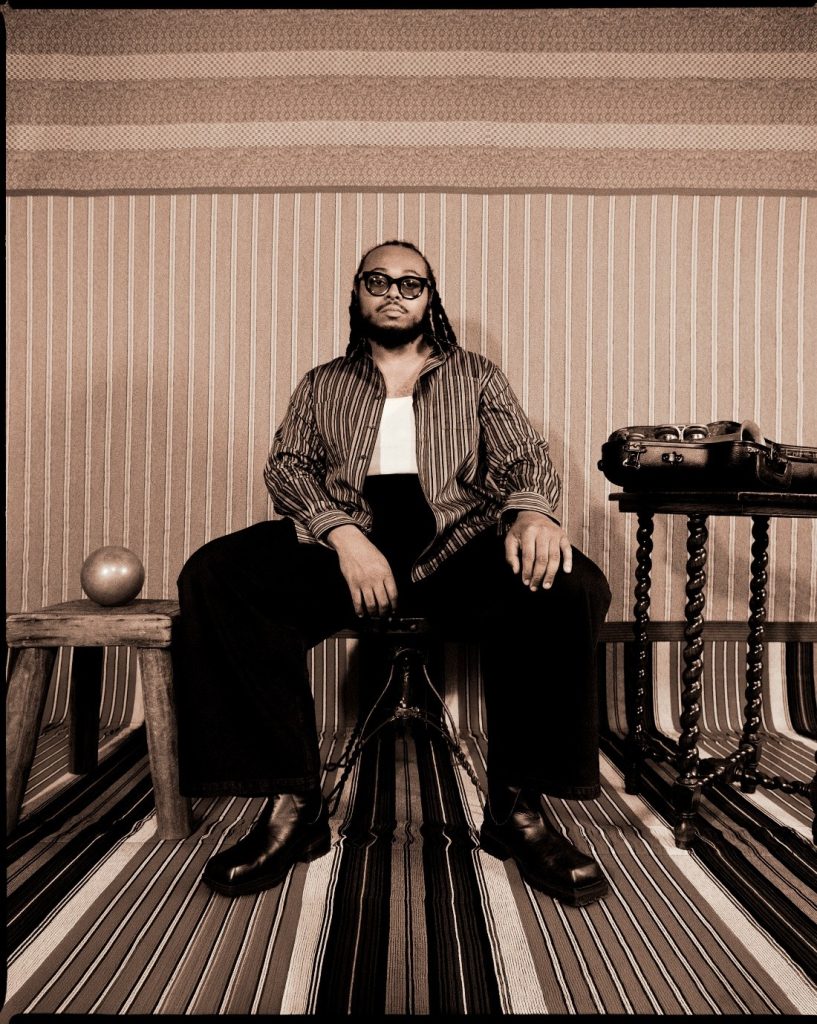Saxophonist Immanuel Wilkins Releases New Single “Dark Eyes Smile” feat. Cécile McLorin Salvant | LISTEN!
IMMANUEL WILKINS SHARES POIGNANT NEW SONG
“DARK EYES SMILE” FEATURING CÉCILE McLORIN SALVANT
SAXOPHONIST’S HIGHLY ANTICIPATED NEW ALBUM BLUES BLOOD ARRIVES OCT. 11
AN EXPANSIVE MULTIMEDIA PERFORMANCE ABOUT THE LEGACIES OF
OUR ANCESTORS AND THE BLOODLINES CONNECTING US
Immanuel Wilkins has shared “DARK EYES SMILE” featuring vocalist Cécile McLorin Salvant, a poignant new song from the acclaimed saxophonist and composer’s highly anticipated third studio album Blues Blood out Oct. 11 on Blue Note Records. A meditative offering co-produced by Meshell Ndegeocello, the album features Wilkins’ quartet with Micah Thomas on piano, Rick Rosato on bass, and Kweku Sumbry on drums; vocalists Ganavya, June McDoom, and Yaw Agyeman; plus special guest appearances by Salvant, guitarist Marvin Sewell, and drummer Chris Dave.
A multimedia performance about the legacies of our ancestors and the bloodlines connecting us, Blues Blood marks the first time Wilkins has included vocalists on an album, with each of the distinctive voices tapping into different aspects of heritage. The album feels airy and celestial, anchored by nostalgia throughout. On “DARK EYES SMILE,” Salvant sings about a paternal figure in his habitat. It’s a sweet yet mournful tune about loved ones becoming ancestors, and how grieving tears become comforting ones. “I remember you now your starlight, yesterday, sitting in your best chair,” she sings. “In my best and worst times, my reflection will resemble you.”
The album title culls inspiration from a quote by Daniel Hamm, a member of the Harlem Six, a group of young boys who were falsely accused of murder in 1964 and severely beaten by prison guards while awaiting trial: “I had to, like, open the bruise up and let some of the blues [bruise] blood come out to show them.” He said this while attempting to seek medical attention for his wounds. The police refused to address Hamm’s injuries because, although they had beaten him themselves, he had no visible blood running across his skin.
Within Hamm’s quote, the mistaken placement of the word ‘blues’ in place of ‘bruise’ when read aloud or silently, lends subtly to a new interpretation of the sentence. “The blues as a feeling has served as a symbol of pleasure in pain for Black folk dating back to work on the plantation,” Wilkins says. “There is a dichotomy of Black people singing songs about how bad their conditions were, yet the blues is something that feels so good.
“Blood is often a symbol of things ancestral and generational,” he continues. “The history and preparation of most foods across the African Diaspora have been passed down through oral tradition. Mothers teach their children recipes that they learned from their mother, and their mother’s mother, so on and so forth, generating a sensorial and ancestral memory through taste and smell.” Meals are cooked onstage during the live performance of Blues Blood. The pan and table are set up with mics, allowing the composition to fill up with the sounds of knives chopping, water boiling, and oil frying in a pan.
While Blues Blood is rooted in the experiences of Wilkins and his collaborators, it’s meant to be a soothing balm for anyone searching for peace, and for Black people trying to reconcile history in a country that tries to erase it. “I don’t even know how to put it in words,” Wilkins says of the album’s sheer potency. “What I do know is that there are alchemical properties in the music. It’s powerful. It’s our calling to take care of this music properly and make sure that it does something to people.”
Wilkins will be performing Blues Blood at upcoming shows at SFJAZZ in San Francisco (Sept. 21), Hyde Park Jazz Festival in Chicago (Sept. 28), and the Big Ears Festival in Knoxville (March 28). See below for a full list of tour dates.
Photo Credit: Joshua Woods
Blue Note Records
